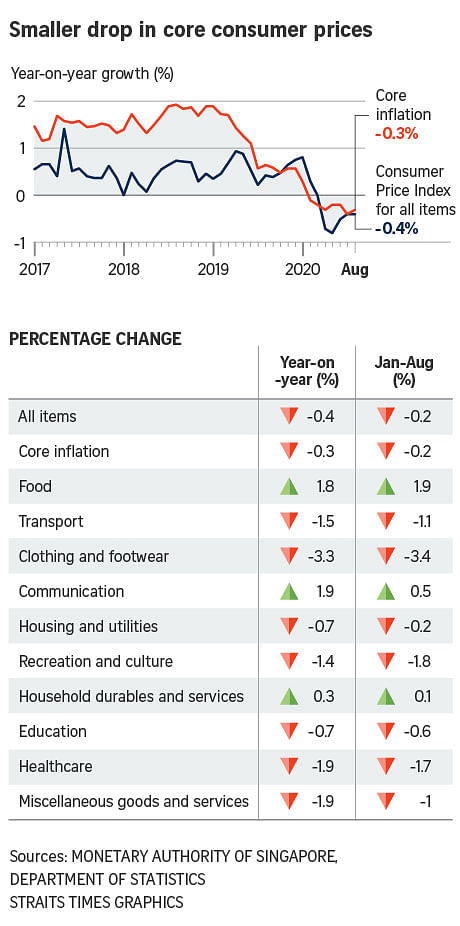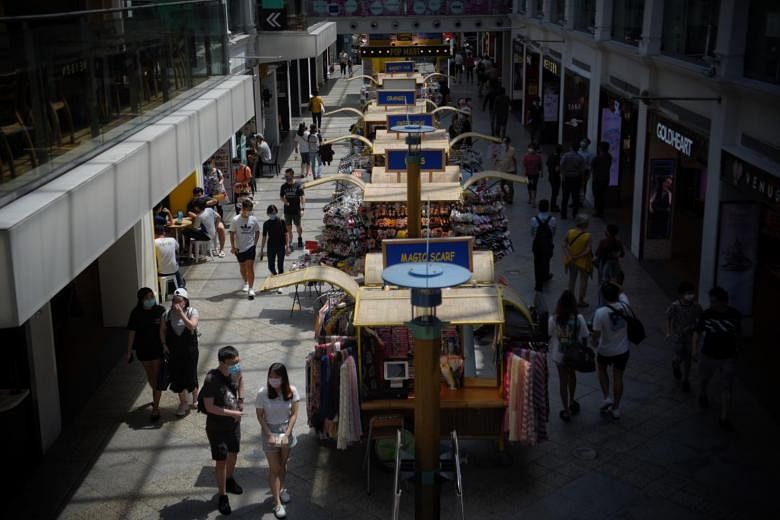SINGAPORE - The slide in Singapore's core consumer prices eased last month on smaller declines in the costs of services, retail and other goods, as well as electricity and gas.
Core inflation, which excludes accommodation and private road transport costs, came in at minus 0.3 per cent in August, up from the decade-low of minus 0.4 per cent in July.
It was the seventh straight month of core consumer prices falling below the same period a year ago.
Meanwhile, overall inflation was unchanged at minus 0.4 per cent as a steeper fall in private transport costs offset the more moderate decline in core inflation, according to data released by the Monetary Authority of Singapore (MAS) and the Ministry of Trade and Industry (MTI) on Wednesday (Sept 23).
Barclays Bank economist Brian Tan said that the gentler decline in core inflation is in line with a gradual recovery in the Covid-hit economy.
"That said, the fact that prices are still underwater suggests the economy remains under significant pressure and far from pre-coronavirus levels."
The inflation data showed private transport costs fell at a faster year-on-year pace of 2.3 per cent in August, compared with the 2.1 per cent drop in July, on lower car price inflation.
The cost of retail and other goods recorded a smaller decline, at minus 1.3 per cent in August compared with minus 1.6 per cent the month before, as the prices of clothing and footwear and recreational goods fell at a more moderate pace.
The cost of electricity and gas also declined at a slower rate in August, at negative 14.6 per cent compared with minus 15.2 per cent in July, as the take-up of new subscriptions under the Open Electricity Market eased.
Food inflation fell in August, with prices rising at 1.8 per cent compared with 2.2 per cent the previous month, owing to lower non-cooked food and food services inflation.
Accommodation inflation was unchanged at 0.4 per cent as housing rents saw a similar pace of increase as in July.
Services costs fell at a slower pace of 0.5 per cent in August, compared with the 0.8 per cent drop the previous month, because of a smaller fall in point-to-point transport services costs and a larger increase in telecommunication services fees.
MAS and MTI noted that in the quarters ahead, external sources of inflation are likely to remain benign amid weak global demand conditions.
They said: "Oil prices are expected to stay low for an extended period, while international food commodity price increases should generally be contained amid improved supply conditions.
"Domestically, subdued economic sentiment and weak labour market conditions will dampen consumer demand, thereby keeping price increases for most discretionary goods and services low. The accumulation of spare capacity in the economy will also curb overall cost pressures."
Inflation is thus expected to remain subdued. MAS and MTI kept their full-year forecasts for both core inflation and overall inflation at between minus 1 per cent and 0 per cent.
Maybank Kim Eng economists Chua Hak Bin and Lee Ju Ye expect inflation to stay negative for the rest of the year, but said the pace of decline will ease as services and retail costs gradually normalise.
"Job losses and wage cuts will likely cap domestic price pressures," they added.
United Overseas Bank economist Barnabas Gan said the bank is keeping its full-year headline and core inflation forecasts at minus 0.3 per cent.
"The mix of falling domestic and tourism-led demand, coupled with low oil prices for the rest of the year, are formidable headwinds against consumer prices," he said.



